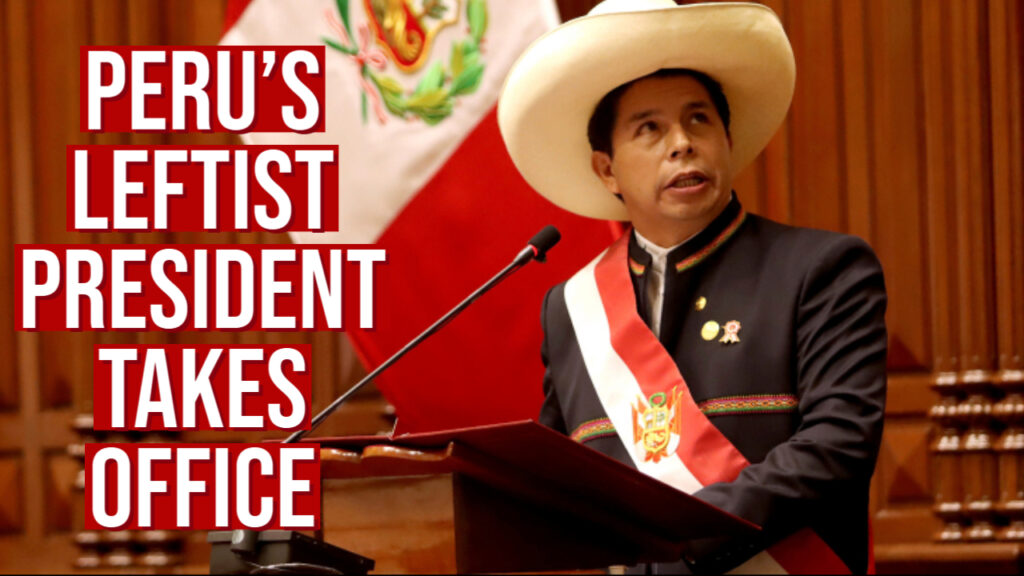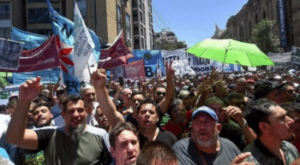Courtesy: Orinoco Tribune, Telesur
José Pedro Castillo Terrones, a 51-year-old teacher of a rural school, assumed the charge of the presidency of Peru today, July 28, a day full of emotion when the country also celebrated 200 years of independence.
The inaugural ceremony was held at the headquarters of the National Congress, where its president, María del Carmen Alva Prieto, placed the presidential sash on Castillo, who was then sworn into office.
The union leader who ran as a candidate for the leftist Peru Libre party thus began his tenure for the 2021-2026 term, with missions of controlling the spread of COVID-19 in the country, reducing poverty after more than 3 decades of neoliberal policies, and providing political stability to a country that has seen four presidents in just five years and a rain of corruption charges.
“I begin by greeting my brothers and sisters the indigenous peoples, my brothers and sisters the ronderos, the teachers, the Quechuas, the Aymara, the Afro-Peruvians, I speak to you on the 200th anniversary of the declaration of independence of Peru, two centuries of republican life. It is an honor for me to be at this place,” said Castillo in his first official message as the president of Peru during the solemn ceremony.
The new president explained that, although this commemoration is highly symbolic, in reality the history of the nation comes from strong, ancient and millennial cultures.
“During four and a half millennia our ancestors found ways to live in harmony with the rich nature that providence offered us,” continued Castillo. “It was like this until the men of Castille arrived, who, taking advantage of a moment of chaos and disunity, managed to conquer the State that until that moment dominated a large part of the central Andes. With the defeat of the Inca Empire started the colonial era.”
Memory
The viceroyalty, added Castillo, allowed the establishment of castes and differences that persist even today. “The three centuries that this territory belonged to the Spanish crown, they exploited the minerals that sustained the development of Europe, largely with the labor of the grandparents of many of us,” he said.
In a detailed historical account, Castillo highlighted that the independence of 1821 did not bring any real improvement for the majority of Peruvians, since the so-called aboriginals continued to be exploited and treated as second-class citizens. “Over time, the old Afro-Peruvian community that had been forcibly brought was added to that from China and Japan, whose blood enriched our veins but who also suffered the same pain as us,” he added.
The president clarified that he was not referring to a remote past, since regimes of slavery and violence persisted until late 20th century, since many farms were sold along with peasants who worked there, and thousands of Peruvians lived in servitude until 1979 when the entire population obtained the right to vote.
However, added Castillo, the social advancements achieved by the people were truncated with Alberto Fujimori’s coup in 1992. “After that, our country has grown under various governments that came to power with the popular vote, however, they have all disappointed us. This time there is a government of the people that has come to govern with the people and for the people,” he promised amidst huge applause.
Castillo stressed that this is the first time that Peru will be ruled by a peasant, a person who belongs to a sector that has been oppressed for so many centuries.
“This is also the first time that a party formed in the interior of the country has won the elections and that a teacher, more precisely a rural teacher, has been elected to be the president,” asserted Castillo. “The pride and the deep pain of Peru runs through my veins. I am a son of this country that was founded on the pain of my ancestors. The history of this silenced Peru is also my history. I want you to know that you have my word: I will not disappoint you.”
At his inauguration ceremony, Castillo also outlined the call for a Constituent Assembly referendum since the current Peruvian Constitution, which dates from the dictatorship of Alberto Fujimori (1900-2000), does not represent the people.
The following is a summary of his priorities as outlined by Castillo in his speech.
Health and social protection
COVID-19 vaccination will be a priority of the new Peruvian government. Policies will be created to guarantee universal access to health care and decent pensions. A new social protection system and a unified health system will be established in the public sector.
A national system of care for dependent persons will be established for the benefit of children, the elderly, and the disabled. The Peruvian state will assume the costs of physical and psychological rehabilitation for victims of sexual violence.
Agriculture and food
Castillo plans to end malnutrition in the shortest possible time through a system of public purchases. The popular organizations that cook food in a communitarian way will be integrated to the public programs.
A plan for the industrialization of the countryside will be implemented, which will include the provision of state-of-the-art equipment for farmers. Irrigation will be prioritized and livestock will be encouraged for the benefit of 1.7 million poor families.
Science and technology
Given that Peru exports commodities with very little added value, Castillo will create a ministry of science, technology and innovation in order to gradually transform the country’s insertion into international markets. This institution will promote research careers among young people to ensure that Peru takes advantage of its human talent.
Oil industry
PetroPeru will participate in all links of the oil value chain in order to regulate final prices and prevent consumers from being exploited for the benefit of monopolistic companies. Public policy will not be based on subsidies but on public sector participation in the markets. Actions will be taken to recover the natural resources that the contracts of previous governments established to favor mainly foreign companies.
Citizen security and an ‘army for development’
The citizen security system will include grassroots organizations (“rondas”) that citizens have created to protect themselves from crime. Young people who do not study or work will have to go to the military service.
In times of peace, the armed forces should assume pro-development functions by participating in the construction of infrastructure such as roads and dams. The institutionality of the Armed Forces will be reinforced through promotions based on merit and not on political connections.
An intercultural State
Castillo proposes an intercultural approach to transform the State. All public institutions should communicate with their users in Indigenous languages. A larger budget will be granted to promote the rescue of cultural and publishing industries.
Environment
Castillo will promote and respect the commitments made by his country in multilateral environmental agreements. He will transform the Ministry of Environment to curb deforestation, guarantee environmental quality standards, promote a low-carbon economy, protect the Amazon, and sanction environmental criminals. He promised Peru will be a carbon neutral country by 2050.
Fight against corruption
The new government will promote actions that will allow legislation to be reformed to strengthen sanctions against officials and private agents involved in acts of corruption. State advertising in the media will be controlled to prevent public spending from being used for political purposes.
A new politics
At the end of his inaugural speech, Castillo announced that he will not govern from the House of Francisco Pizarro because this building is a symbol of colonial domination. “We must break with colonial symbols. We will cede this palace to the Ministry of Cultures to be used as a museum,” he added in front of Spanish King Felipe VI, who was among the guests at the inauguration.
So that there are no doubts about his aspirations, the leftist leader clearly stated that he will return to his work as a teacher in 2026 when his presidential term ends. Then, using Quechua, the Indigenous language of his ancestors, he summed up his agenda in one sentence:
“One force, one heart, one direction. And that direction will be progress and social justice for all.”
Pedro Castillo to Give Up His Salary as President
Earlier, on Sunday, July 25, Peru’s leftist President-elect Pedro Castillo announced that he will give up his lifetime salary as president and hold functions with his pay as an elementary school teacher in order to fight for equality in the Andean country.
“Let’s remove the golden wages. I ratify to lead our country’s destinies with my salary as a teacher”, he stressed adding that he will propose to the National Assembly to reduce by 50 percent the lifetime incomes of lawmakers and ministers.
Bolivia & Peru Announce ‘Binational Cabinet’ with Social Movements
Bolivia’s President Luis Arce has announced that a ‘Binational Cabinet’ will be installed with Peru to deal with matters of importance to both countries and where social movements will participate.
President Arce attended the inauguration of Pedro Castillo and held a meeting with the new Head of State afterwards. Coming out of the meeting Arce stated, “In a meeting with our brother President Pedro Castillo, we have decided to reinstate the Binational Cabinet between Bolivia and #Peru, together with the social movements of both countries, as soon as possible. This time we will be the hosts.”
“There are many issues that we must address, such as energy, trade and the inter-oceanic train. The new Binational Cabinet will mark the beginning of a cycle of mutually beneficial meetings between the two peoples. Long live the Patria Grande!” President Arce added.
The Binational Cabinet began under Evo Morales where the project for the inter-oceanic train was launched, the project is especially important for Bolivia because it consists of a single train line from the Peruvian coast that will run through Bolivia’s three major cities (La Paz, Cochabamba, and Santa Cruz), thereby giving Bolivia direct access to the sea which the country currently doesn’t have. However, it was originally conceived with the idea of running through to Brazil’s Atlantic coast. Bolsonaro pulled out and the plan was ultimately scrapped by the coup regime who cut funding to almost all state infrastructure projects.
The Binational Cabinet will also be bolstered by a greater ideological affinity between the governments of Luis Arce and Pedro Castillo.
US already pressuring Peru for destabilizing agenda in Latin America
In a letter published on the US Department of State website and that of the US Embassy in Peru, the US hegemonic diplomacy once again evidenced its true nature by trying to push the new Peruvian administration of Pedro Castillo towards supporting the destabilizing US agenda against Venezuela, Nicaragua and Cuba.
The US State Department sent a belated congratulation to Castillo for his victory that was plagued with several weeks of sabotage and violence promoted by Peruvian right wingers allied with the United States. The Biden administration has maintained complete silence on the delay of Peruvian authorities to recognize his victory. Without mentioning any of this, the press release stated that “the Secretary of State Antony J. Blinken spoke with Peruvian President-Elect Pedro Castillo and offered congratulations to the people of Peru for an electoral process indicative of a strong and vibrant democracy.”
“He thanked Peru for its support in addressing the Venezuela crisis, and expressed his hope that Peru would continue to play a constructive role in addressing the deteriorating situations in Cuba and Nicaragua,” continued the document, clearly trying to exploit Castillo’s legislative weakness to US advantage, and to force him to go against the most progressive Latin American countries that are demonized and sanctioned and are suffering constant US-led destabilization operations just for being independent and maintaining relations with China and Russia.
(A compilation made by us from reports in Orinoco Tribune and Telesur.)




